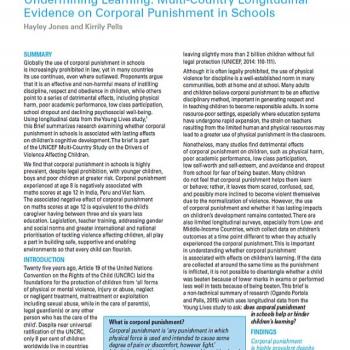
Globally the use of corporal punishment in schools is increasingly prohibited in law, yet in many countries its use continues, even where outlawed. Proponents argue that it is an effective and non-harmful means of instilling discipline, respect and obedience in children, while others point to a series of detrimental effects, including physical harm, poor academic performance, low class participation, school dropout and declining psychosocial well-being. Using longitudinal data from Young Lives, this Brief summarises research examining whether corporal punishment in schools is associated with lasting effects on children’s cognitive development.The brief is part of the UNICEF Multi-Country Study on the Drivers of Violence Affecting Children.
We find that corporal punishment in schools is highly prevalent, despite legal prohibition, with younger children, boys and poor children at greater risk. Violence in schools, including physical and verbal abuse by teachers and peers, is the foremost reason children aged 8 give for disliking school. Corporal punishment experienced at age 8 is negatively associated with maths scores at age 12 in India, Peru and Viet Nam. The associated negative effect of corporal punishment on maths scores at age 12 is equivalent to the child’s caregiver having between three and six years less education. Legislation, teacher training, addressing gender and social norms and greater international and national prioritisation of tackling violence affecting children, all play a part in building safe, supportive and enabling environments so that every child can flourish.

Globally the use of corporal punishment in schools is increasingly prohibited in law, yet in many countries its use continues, even where outlawed. Proponents argue that it is an effective and non-harmful means of instilling discipline, respect and obedience in children, while others point to a series of detrimental effects, including physical harm, poor academic performance, low class participation, school dropout and declining psychosocial well-being. Using longitudinal data from Young Lives, this Brief summarises research examining whether corporal punishment in schools is associated with lasting effects on children’s cognitive development.The brief is part of the UNICEF Multi-Country Study on the Drivers of Violence Affecting Children.
We find that corporal punishment in schools is highly prevalent, despite legal prohibition, with younger children, boys and poor children at greater risk. Violence in schools, including physical and verbal abuse by teachers and peers, is the foremost reason children aged 8 give for disliking school. Corporal punishment experienced at age 8 is negatively associated with maths scores at age 12 in India, Peru and Viet Nam. The associated negative effect of corporal punishment on maths scores at age 12 is equivalent to the child’s caregiver having between three and six years less education. Legislation, teacher training, addressing gender and social norms and greater international and national prioritisation of tackling violence affecting children, all play a part in building safe, supportive and enabling environments so that every child can flourish.

